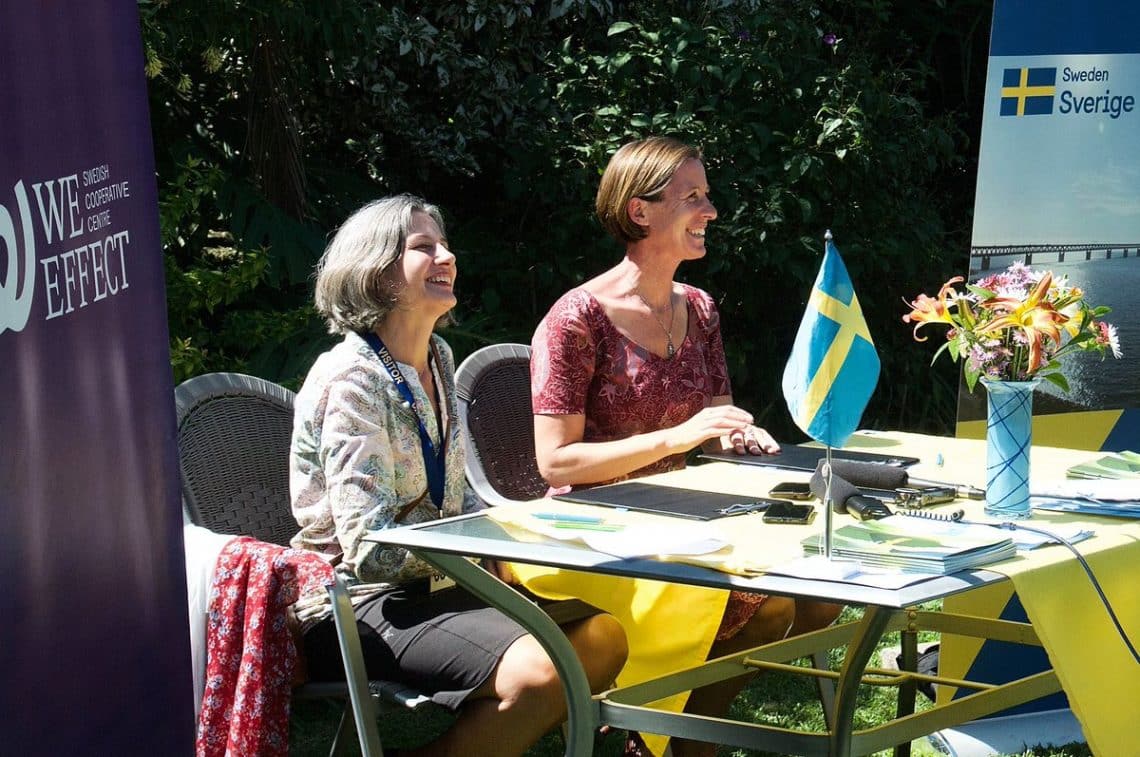By Joyce Mukucha
To ensure the continuation of the Enterprise and Business Development Programme (EBDP) on improving livelihoods of rural women, the Government of Swedish has partnered We Effect and signed a SEK 30 million (US$ 3,6 million) agreement.
Speaking during the signing ceremony on the 8th of May 2018 in Harare, Sofia Calltorp, the Ambassador of Sweden to Zimbabwe said it was important to take development to rural women and ensure that there their lives were sustained.
She said the programme, is running from 2018 to 2021, was going to invest in US$ 50 million from various programmes and this new support will build on the solid foundation of the successes of the previous programmes of the We Effect supported by Sweden.
“Through these programmes, more than 60,000 rural people, mainly women, were mobilised to participate in internal savings and income generating activities through development of both agriculture and non-agriculture enterprises.
“The EBDP aims for improved sustainable livelihoods and food security for rural women and young people and is expected to result in doubling of the household income for 67 500 rural women and increasing the annual income for men and young entrepreneurs from US $ 3425 to US$ 6 850,” she said.
The EBDP programme, she said, resulted in increased household income-generation and improvement of livelihoods for the beneficiaries and their families.
The projected outcomes are prolific and promote decent work for rural women and youth through on-and off-farm green enterprise development. The planned activities resonate with Sweden’s new strategy for development co-operation for Zimbabwe that looks at livelihoods, environment, climate change and renewable energy.
The Ambassador said she was proud about the renewed partnership with We Effect and hoped that it was going to bring positive results to Zimbabwe.
“We Effect will together with partners also identify promising ‘green’ entrepreneurs and help boost their enterprises in line with green business development practices in sectors such as renewable energy, rural housing, general trading and services.”
Targeted areas of agriculture will include livestock, grain, horticulture, oilseeds, tubers, apiculture, aquaculture and forestry. Farm entrepreneurs will benefit through the training they will receive. They will be trained to apply environmentally sustainable climate smart techniques and practices including conservation farming, agroforestry, forestry and domestic water harvesting.
Emphasising about the project, Maria Schultz, the We Effect Southern Africa Regional Director said the signing of the agreement will lead to the introduction of new innovative approaches that will be used to achieve the desired results. These include developing sustainable food value chains based o FAO’s Sustainable Food Value Chain concept, support to on- and off-farm business development within the green economy.
“The project will lead to the development of enterprise clubs, district commodity and market linkage associations, use of the study circle methodology to generate business ideas and start and or improve a business and use of lead farmer concept. Our aim is on economic empowerment of rural women. I thank the Sweden Embassy with the opportunity to support women,” said Schultz.
The GREEN EBDP was developed as a successor programme building on the successes, findings, lessons learnt and recommendations from the evaluation of the Enterprise and Business Development Programme implemented from 2014 to 2017. It was also supported by Sweden to tune of (US$1, 9million).
We Effect is a Swedish development cooperation organisation that works on the principle of self-help targeting women and men living in poverty. It aims at creating a sustainable and just world free from poverty. The organisation works in 25 countries in Asia, Europe, Latin America as well as Southern and Eastern Africa.
In Southern Africa, We Effect works in Malawi, Mozambique, Zambia and Zimbabwe. It has been active in Zimbabwe since 1984 and to date has been implementing various rural development projects, mainly focusing on sustainable agricultural production, local enterprise devilment among others.






